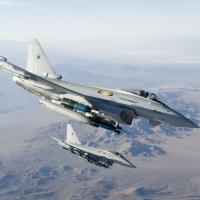From the Composer… Roderick Williams
My first thought on being commissioned to write a piece to mark the centenary of the founding of the RAF was that this would carry with it a testing responsibility. To do justice to the servicemen and women past and present and also leave a legacy for the future was quite a daunting brief, especially for a civilian such as myself.
I was keen from the outset that the sound of iconic military aircraft should be a part of the piece and so I searched out short sound-clips that would give me the basic structure of the piece, taking us from the very beginnings of flight, through two world wars and on, up to the present day and beyond. These sound-clips punctuate the piece and also provide the sonic inspiration for four concert band interludes. I wanted to try as best I could to capture these emotive sounds and gradually mould them into musical gestures.
I’m very grateful to former RAF pilot and LCC member Dai Whittingham for introducing me to a volume of aviation poetry, ‘Give Me the Wings’, edited by Martin Barraclough. Perusing its pages for suitable material proved to be a disarmingly moving experience and I felt it important to try to convey as wide a range of the complex emotions and reflections therein as possible. I chose to set some of the poetry for the various combinations of choirs available but also wished for other poems to be spoken, specifically by both male and female narrators as this is a sequence with relevance for anyone.
Dai also was instrumental in introducing me to Andy Evans and his team of aeronautical acrobats at The Blades. Andy took me up in a two-seater display craft to allow me to share his inexhaustible thrill of flight, darting between the clouds, looking down on the earth below from a pilot’s perspective. He and his colleagues also hinted at the ever-present sense of threat and peril when flying in service, on a mission, in combat.
I am hugely grateful to Wing Commander Piers Morrell for inviting me to RAF Northolt to observe a rehearsal of the Wind Band, who gave me a real taste of what they can do. I also wish to express my gratitude to Mark Forkgen for thinking of me for this commission. He has made available not one, not two but three choirs and he and his team have given me nothing but support.
The piece begins and ends with the sound of air to remind us how tantalizing has been the desire for human beings to be up there in the skies with the birds and the angels. The words then trace the development of flight by way of the earliest World War One aircraft and on into the Second World War. The voices of the Youth Choir are a reminder of just how young were many of the pilots and crews who put their fate in the hands of these war machines.
There is dark, gallows humour in the movement for men’s voices, as servicemen coped with the stresses of combat by letting off steam. But there is also, I hope, a great deal of pride in the comradeship within the RAF and also a basic sense of wonder and freedom in being airborne. This brings us up to date with the inclusion of helicopters, integral to the Search and Rescue role of the RAF, both in and outside of combat, and finally to the part technology is playing as the armed forces look to the future.
Composer: Roderick Williams Title of Musical Work: Per Ardua ad Astra - Through Adversity to the Stars